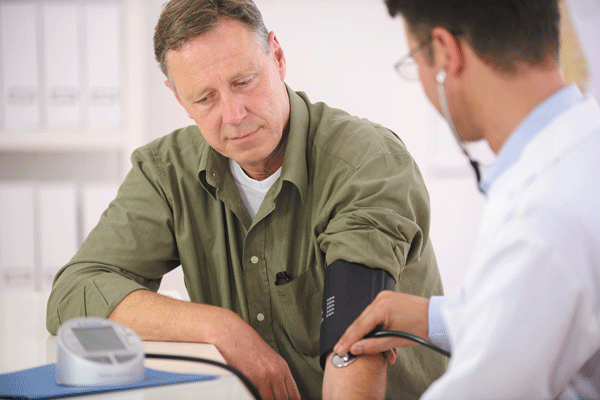
Can saw palmetto treat an enlarged prostate?

How does Ozempic work? Understanding GLP-1s for diabetes, weight loss, and beyond

Zinc: What it does for the body, and the best food sources

Respiratory health harms often follow flooding: Taking these steps can help

Tips to leverage neuroplasticity to maintain cognitive fitness as you age

Can white noise really help you sleep better?

Celiac disease: Exploring four myths

What is prostatitis and how is it treated?

What is Cushing syndrome?

Exercises to relieve joint pain
Heart Health Archive
Articles
FDA approves a one-two punch for some strokes
The FDA has approved use of a clot-retrieving device along with a clot-busting drug on stroke patients, as long it’s within six hours of the onset of stroke symptoms.
Reminder: Don't skip blood pressure medication
Millions of older adults aren’t taking their blood pressure drugs as directed. Ways to combat adherence problems include asking a doctor for less expensive drugs, understanding what a medication is for, and reporting side effects.
Keep tabs on your drinking
When it comes to alcohol, moderation is still the mantra. But even one drink a day may pose a risk to the heart.
Wine, champagne, and cocktails are standard fare at many holiday gatherings. But before you raise your glass, make sure you're aware of just how much alcohol you're actually consuming—and how it may affect your heart.
As part of a standard health history, most physicians will ask about your drinking habits. In general, moderate drinking—defined as one drink per day for women and two drinks per day for men—is considered safe. But there are some caveats.
Ask the doctor: Reversing atherosclerosis?
Some people may be able to reverse the buildup of plaque inside their heart’s arteries by taking high-dose cholesterol-lowering drugs or by following a strict, plant-based diet combined with exercise and stress reduction.
Ask the doctor: Checking for blocked arteries in heart failure?
When a person develops heart failure without a good explanation for the underlying cause, a heart catheterization to check for blockages in the coronary arteries may be appropriate.
How to trim your medication costs
Prescription drug prices are rising. Three strategies may help lower your pharmacy bill.
Image: UrosPoteko/Thinkstock
If you're trying to avoid (or already have) heart disease, chances are you're taking several prescription medications. In fact, about a third of adults over age 62 take at least five prescription drugs, which can be a real budget buster for some people. And recent rises in drug prices, especially for new, brand-name medications, are enough to make anyone gulp.
"By working with your doctor and your pharmacist and spending some time shopping around, you may be able to lower your pharmacy bill," says John Fanikos, director of pharmacy at Harvard-affiliated Brigham and Women's Hospital. He suggests three main strategies:
Thinking about sex after a heart attack
Frank discussions with a doctor can help heart attack survivors return to sexual activity.
Image: UrosPoteko/Thinkstock
Few things shake your sense of well-being more than a sudden heart attack. When the initial shock wears off, an over-whelming need to get life back to normal as quickly as possible usually takes hold. "Patients always ask me when can they drive again, when can they start exercising, and when can they return to work," says Dr. Donna Polk, a cardiologist at Harvard-affiliated Brigham and Women's Hospital. A key issue that seldom gets mentioned, though, is the struggle many heart attack survivors encounter when trying to resume their sex lives.
The same physical changes involved in a heart attack can conspire to diminish sexual enjoyment. Faulty circulation throughout the body, a hallmark of cardiovascular disease, reduces the amount of blood that reaches the sex organs. Men may develop erectile difficulties, and women may not have the blood flow needed for vaginal arousal and lubrication.
Blood pressure: Can it be too low?
New findings focus on diastolic blood pressure—the second number in your blood pressure reading.
Image: mangostock/Thinkstock
Of the two numbers that make up your blood pressure reading, the first one (systolic blood pressure) typically gets more attention. That's because as people age, their arteries lose their elasticity, and the inner walls are more likely to accumulate cholesterol-laden plaque. These factors tend to raise systolic blood pressure, a measure of the pressure inside the arteries when the heart contracts to pump blood throughout the body.
Current guidelines suggest that most people should aim for a systolic blood pressure reading of 140 millimeters of mercury (mm Hg) or lower. But last year, a widely publicized clinical trial suggested that a target of 120 mm Hg could further reduce the dangers associated with high blood pressure (namely, heart attack, stroke, heart failure, and death).
To keep your heart working well, stay active as you age
As people grow older, their hearts tend to become thicker and stiffer and not pump as effectively. But those who stay physically active as they move from middle age into their 70s may be less likely to develop age-related declines in heart function.
Gene discoveries may pave the way for new blood pressure drugs
The discovery of 44 gene sites associated with high blood pressure may provide leads for developing new drugs to treat this common condition.

Can saw palmetto treat an enlarged prostate?

How does Ozempic work? Understanding GLP-1s for diabetes, weight loss, and beyond

Zinc: What it does for the body, and the best food sources

Respiratory health harms often follow flooding: Taking these steps can help

Tips to leverage neuroplasticity to maintain cognitive fitness as you age

Can white noise really help you sleep better?

Celiac disease: Exploring four myths

What is prostatitis and how is it treated?

What is Cushing syndrome?

Exercises to relieve joint pain
Free Healthbeat Signup
Get the latest in health news delivered to your inbox!
Sign Up










